
Natural Soap: Goat Milk Oatmeal
- Out Of Stock
We often hear from customers looking for natural soap recommendations tailored to their specific skin type. And while we love helping, these questions can be tricky—because your skin is uniquely yours. Skin type is largely determined by genetics, and even then, your skin's needs can shift depending on:

That’s why we always suggest starting with small, travel-size bars. Take note of which natural soaps YOUR skin likes or dislikes, and look for patterns in the ingredients. You may discover that your skin prefers soaps high in olive oil, shea butter, or coconut milk.
We have put together some general recommendations based on feedback from friends, family, and long-time customers. Keep in mind—these are just starting points. You will notice some overlap in our suggestions. That’s because some of our most loved soaps have a gentle, balanced formulation that works well for a variety of skin needs.
Take our Dead Sea Spa soap, for instance. Some customers with oily skin swear by it, but it is also a favorite of mine—and I have dry, aging skin!
One thing that sets us apart from other natural soap companies is our commitment to creating a unique formulation for each bar. While some companies rely on one base recipe and simply change the scent, we handcraft each soap variety with its own distinct blend of plant oils, butters, and botanicals. No two are the same.
One customer described her skin this way:
"My T zone is oily. The skin on my cheeks and around the eyes and neck is dry. My legs and arms are dry. My back is oily, and front torso is just right."
I guess I would call this combination skin!!
Wherever your skin lands on the spectrum, we are here to help you navigate our selection and find the bar that feels just right for your one-of-a-kind skin.
Dry skin occurs when the skin's sebaceous glands produce less natural oil (sebum), disrupting the skin's essential moisture barrier.

As a result, water evaporates more quickly, leaving the skin feeling tight, irritated, and red, with increased sensitivity and a greater likelihood of fine lines and wrinkles.
The dry, flaky texture leads to dull, lackluster skin.
Alcohol-based products and body cleansers made with synthetic detergents, fragrances, and colors can exacerbate dry skin conditions.
Through research and customer feedback, we have discovered that certain ingredients can provide relief. Dry skin types often thrive when soaps contain:
These ingredients can help replenish moisture, soothe dryness, and support the skin's natural barrier function.
Learn more about dry skin on our Help Me Choose: Dry Skin page










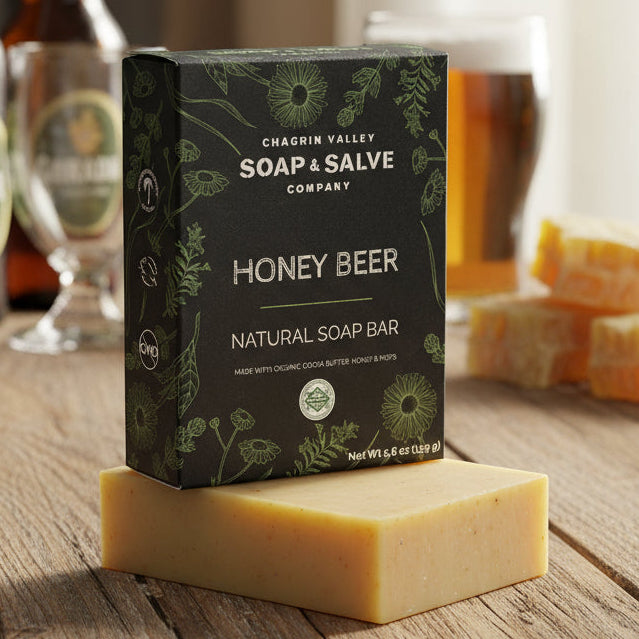
Oily skin is the result of excessive secretions of sebum. It tends to attract more dirt and dust than dry skin and may be prone to blackheads and acne.
 Ironically, many soaps and body washes marketed "for oily skin" can exacerbate the issue.
Ironically, many soaps and body washes marketed "for oily skin" can exacerbate the issue.
These products often contain skin-drying ingredients, such as alcohol, detergents, and synthetic additives, which strip away too much of the skin's natural oils.
Initially, this may seem like a solution (let's dry out all the oil), but it actually triggers a vicious cycle. The dry skin responds by producing even more sebum, perpetuating the oiliness. Furthermore, comedogenic ingredients like mineral oil and petroleum-based additives can clog pores and lead to blemishes and acne.
If your skin is oily, you do not want a soap that will dry out your skin. You want a natural soap that will clean and help balance skin oils.
How do we decide which soaps work better for oily skin? Most of our recommendations are based on customer feedback.
In general, natural soaps containing citrus essential oils, woodsy oils, and rosemary work well for oily skin. Exfoliating soaps can help remove bacteria and waxy oils from the pores.
Our Bamboo Charcoal Soap is a great body and complexion soap for oily skin. Skin-freshening ingredients offer a soothing yet deep cleanse that leaves skin feeling soft and smooth. Activated charcoal, tea tree oil, sea salt, and bentonite clay help cleanse the skin, while cocoa butter adds an emollient layer that locks in natural moisture to soothe and hydrate.
Remember, everyone's skin is unique, and natural soap bars can behave differently for different people. To find the best fit for your oily skin, try sampling different soaps to discover which one works harmoniously with your skin.
Find out more about oily skin on our Help Me Choose Oily Skin and Acne page.







Eczema, also known as atopic dermatitis, is a chronic skin condition characterized by inflammation, irritation, and dryness. Affected areas often become itchy, rashy, and scaly, with thickened skin.
 Psoriasis, on the other hand, is an inflammatory disorder that originates deep within the skin, disrupting the normal skin cell turnover process. With multiple types and varying severity, psoriasis symptoms can range from mild to severe.
Psoriasis, on the other hand, is an inflammatory disorder that originates deep within the skin, disrupting the normal skin cell turnover process. With multiple types and varying severity, psoriasis symptoms can range from mild to severe.
Both conditions require gentle, nourishing care to manage symptoms and promote healthy skin.
We suggest that people with chronic skin problems begin with mild natural soaps that contain no essential oils.
Soaps like the Goat Milk Oatmeal, Carrot & Honey, Castile and Cocoa Butter, or any soaps listed below that say “no added scent.” Some people have also found the Sea Buckthorn Soap and Neem and Tea Tree Soap to be very helpful.
Sea Buckthorn oil has been used to treat skin disorders in Eastern medicine for centuries. It is also believed to be a natural remedy to help treat periodic flare-ups of psoriasis as well as eczema.
By switching to a natural, more gentle skin care regimen, the goal is to avoid further irritation caused by irritants in commercial products.
Find out more about Eczema and Psoriasis skin on our Help Me Choose Eczema & Psoriasis page.







Rosacea is a chronic, inflammatory skin condition that principally affects the face.

Rosacea symptoms can vary greatly from one individual to another. It often begins with a tendency to blush or flush more easily than others and is characterized by flare-ups and remissions.
As a skincare company, we are not trying to treat the condition, the best we can hope for is to help ease some of the symptoms associated with rosacea.
We recommend our Sea Buckthorn & Tea Tree Natural Soap to help control flare-ups. It contains many of the natural ingredients often recommended to help rosacea.
Be gentle when you wash your skin, especially facial skin. Do not rub or scrub the skin. Using fingertips only, gently massage skin moving in a circular motion. (Save the washcloth only for times you want to gently exfoliate.) Rinse with lukewarm water and blot dry with a clean cotton towel.
Check out "Help Me Choose Products For Rosacea."



Many people claim to have sensitive skin, but what does that really mean?
 For some, it is a matter of thin or fine-textured skin that reacts quickly to temperature changes and is prone to sunburns, windburns, dryness, and allergic reactions.
For some, it is a matter of thin or fine-textured skin that reacts quickly to temperature changes and is prone to sunburns, windburns, dryness, and allergic reactions.
Other people have skin that is sensitive to environmental factors.
Seasonal temperature and humidity changes, very hot water, detergent soaps, synthetic fragrances and colors, preservatives, alcohol (used on the skin), and other artificial ingredients become triggers that lead to irritated, red, blotchy, and itchy skin.
We have found that our natural soaps, free from artificial ingredients, may help provide relief for sensitive skin. One customer, who had previously reacted to numerous soaps, discovered that our Goat Milk Oatmeal soap worked beautifully for her. She went on to try our other natural soap bars and was thrilled to find that she had no adverse reactions, saying, "I guess I'm sensitive to every soap but yours!"
To learn more about sensitive skin, see our Help Me Choose Sensitive Skin page.








On average, we generate a new layer of skin every two to four weeks. As we age, there is a gradual decrease in the rate at which the old dead cells leave the surface of our skin.

These dead skin cells accumulate on the skin's surface and are responsible for a dull, lifeless appearance.
Although soap will remove dirt and excess oil, most soaps alone cannot remove all the excess dead cells.
The natural soaps shown below are the soaps we call "exfoliating" soaps, but we have many soaps that contain ingredients that provide gentle exfoliation.





Our natural soaps are mild, gentle, and naturally moisturizing. So what makes a complexion soap?
 Complexion soaps are superfatted more than body soaps.
Complexion soaps are superfatted more than body soaps.
Superfat refers to the extra amount of oil added to a soap or shampoo bar recipe that does not fully react with the lye, leaving a small amount of excess or unsaponified oil in the finished soap. This excess moisturizing oil becomes trapped between the soap molecules and is released onto the skin during washing.
Complexion soaps are unscented or lightly scented with pure essential oils known to be good for facial skin.
The natural soaps we recommend as complexion soaps are formulated with facial clays, extra butters, and skin moisturizing and nourishing ingredients that can add new life to dull, sluggish complexions.
That said, I have used all of our natural soaps on my face. My face’s favorites often contain lots of coconut milk, like the Sage Mist and Lavender Rosemary, neither of which are considered complexion soaps. Try different trial size bars because, in the end, your choice of natural facial soap depends on your unique skin type.










 To make a soap or any skincare item completely "unscented," commercial companies must add scent-neutralizing chemicals.
To make a soap or any skincare item completely "unscented," commercial companies must add scent-neutralizing chemicals.
A natural soap bar with "no added scent" does not mean it is scent-free. It means that we have NOT added essential oils to that recipe.
Our natural soaps with "no added scent" may still have natural aromas due to unrefined oils and butters, honey, grains, flowers, spices, herbs, or herbal-infused oils.
For example, our Chocolate & Honey, Castile & Cocoa, and Honey Butter soaps have the scent of rich cocoa butter, and our Castile & Shea Soap has the light scent of virgin shea butter. These scents tend to be very mild.










Some people tell me that they would love to switch to a natural soap to get rid of the chemicals and the plastic bottles.
 So what is stopping them? They often believe that bars of soap are less hygienic than liquid soap.
So what is stopping them? They often believe that bars of soap are less hygienic than liquid soap.
My answer, of course, is that liquid soap is NOT more hygienic than solid soap bars!
It may seem like an odd question to ask whether something specifically created to help make you clean is hygienic, but actually, it is an excellent question that has actually been studied.
Numerous studies have shown that although bacteria levels on a used bar of soap are slightly higher than on unused soaps, there are no detectable levels of bacteria left on the skin's surface after using a bar of soap.
Bacteria do not like to live in the actual soap bar, they are attracted to water that sits on top of the soap after use. When using a bar of natural soap properly, creating a lather with a 30-second scrub and very warm water, the top layer, dirt, and germs are washed down the drain.
So if you are still concerned, doing a couple of simple things will help your bar soap harbor fewer germs.
So it seems that when considering "soap" the choice is between a bar and a liquid in a bottle.
So my question is . . . how hygienic is liquid soap? And how often do you clean the top of your liquid soap dispenser?
For a more detailed discussion (especially about liquid soap) please read our blog, "Are Bar Soaps Hygienic?"
 How long a natural soap bar will last depends on:
How long a natural soap bar will last depends on:
For one person showering every day, a well-drained bar should last for about one month.
Natural soaps are normally softer than commercial soaps because they retain their natural glycerin (which is removed in commercial soap production) and contain no artificial hardening chemicals, synthetic waxes or free alkali.
We also superfat our soaps (add extra oils or butters) and use "softer" oils so that Chagrin Valley natural soaps are more emollient and leave skin feeling moisturized.
Different oils impart different qualities to soap. Some add lathering qualities, some moisturizing, some hardness, and so on. Compared to other natural bars, we use a larger percentage of extra moisturizing and conditioning oils in our soaps and shampoo bars. These oils produce a bar that may not be as hard as bars with less conditioning oils.
How you use the bar will also affect its lifespan. For example, do you use a washcloth, an exfoliating accessory, or only the bar? Although exfoliating loofahs and sponges are great they will use up the soap much faster than a washcloth or the "only the bar" purists.
Our Natural Soap Will Last A Long Time With Proper Care
Cute Story: A customer called to say she loved our soaps but could not buy them anymore because they did not last as long as other soaps. A week later she called to place an order and apologize. Her husband, who would NEVER use her natural soaps before, fell in love with her new Juniper soap . . . and he showered twice a day!
To maximize the life of your soap, keep it in a well-drained soap dish so it can dry between uses.
We sell a handcrafted solid white oak soap dish. The deep ridges are perfect for keeping your all natural handcrafted soap dry between uses. White Oak is the wood used in shipbuilding.
A tip passed on by one of our customers whose kids always leave the soap in a water puddle: cut the large bars in halves. Then alternate the halves, allowing a longer drying time between uses.
Yes, they are!
Chagrin Valley natural soap and shampoo bars are made with natural and organic ingredients and are biodegradable when used properly.
They’re thoughtfully crafted to break down naturally in the environment, which makes them a responsible choice for everyday use and for outdoor adventures when used with care.
By definition, biodegradable means capable of being broken down by living organisms, such as naturally occurring bacteria, into simpler substances that are not harmful to the environment.
Natural soap made with plant oils, butters, and clays can biodegrade efficiently — but where and how it’s used matters.
Bringing a biodegradable soap on a camping or backpacking trip is a wonderful way to stay comfortable and refreshed outdoors. However, even biodegradable soap should never be used directly in lakes, rivers, or streams.

You may see claims online suggesting that biodegradable soap or shampoo is safe to use directly in rivers and streams.
While these claims are often made with good intentions, they overlook an important part of how biodegradation actually works.
The bacteria responsible for breaking down natural soap live primarily in soil, not water.
That means soap — even biodegradable soap — breaks down most effectively when it comes into contact with organic soil, not freshwater sources.
Even biodegradable soap will pollute lakes and streams if it is not used properly.
So while our soaps are biodegradable, they are designed for mindful outdoor use, not for bathing, washing dishes, or cleansing directly in natural water sources.
A few simple practices help protect waterways and support natural breakdown:
These methods help surround the soap with organic matter, speed up decomposition, and reduce runoff.
Yes — when used responsibly.
Many commercial soaps, body washes, shampoos, and dish detergents contain synthetic surfactants, artificial fragrances and colors, and chemical preservatives.
Since these ingredients do not break down quickly, traces can persist in the environment for many, many years and can have a potential negative impact on plants and animals.
A biodegradable natural soap made with plant-based ingredients breaks down more readily when exposed to soil bacteria, making it a far better choice for outdoor use — as long as it’s used thoughtfully and away from waterways.
Biodegradable doesn’t mean anywhere.
It means used with intention and respect for nature.
That philosophy is at the heart of how we make our soaps — and how we encourage them to be used.
There’s no substitute for nature. Together, we can protect it from impacts like overuse, trash, and harming endangered wildlife by following the principles of "Leave No Trace."
Chagrin Valley Soap & Salve has been Leaping Bunny Certified since 2013.
 The Leaping Bunny Program was developed in 1996, by The Coalition for Consumer Information on Cosmetics (CCIC), to identify and support companies that are doing their part to help eliminate the unnecessary use and mistreatment of animals to test cosmetic products and ingredients. The CCIC is made up of eight animal protection groups including the Humane Society of the U.S., as well as groups from Canada and Europe.
The Leaping Bunny Program was developed in 1996, by The Coalition for Consumer Information on Cosmetics (CCIC), to identify and support companies that are doing their part to help eliminate the unnecessary use and mistreatment of animals to test cosmetic products and ingredients. The CCIC is made up of eight animal protection groups including the Humane Society of the U.S., as well as groups from Canada and Europe.
At Chagrin Valley we do not test our finished products on animals (other than human volunteers). But what about the raw materials, the ingredients we use?
Many products display labels claiming that their finished product is ‘not tested on animals’ but this does not guarantee that the product ingredients are actually free from animal testing.
The CCIC Standard is a pledge that a company makes to remove animal testing from all stages of product development. Our pledge to buy ingredients that are cruelty-free is integrated into the purchase agreement for all of our suppliers.
Personal care products displaying the “real” Leaping Bunny logo are certified ‘cruelty-free' using the internationally recognized Humane Cosmetics Standards. These rigorous standards require that no animal testing is performed or authorized for finished products or any of the ingredients in any stage of product development by the company, its laboratories or its suppliers after a fixed cut-off date. All Leaping Bunny companies are subject to independent audits and pledge commitments that are renewed on an annual basis.
This annual renewal is a key requirement that sets the Leaping Bunny Program apart from other cruelty-free certification programs. Companies that manufacture products, as well as their ingredient suppliers, must annually recommit to upholding their promise to not conduct animal testing on any finished products, ingredients, or formulations.
Why is this annual commitment renewal important? "Because product formulations change, suppliers come and go, and manufacturers develop innovative lines to meet consumer needs. But we know that compassionate consumers need to be confident that no animal testing is involved in the products they use."
At Chagrin Valley Soap & Salve . . .
The Leaping Bunny Program provides
the best assurance to consumers
that they are making compassionate shopping choices
by purchasing Cruelty-Free skin care!
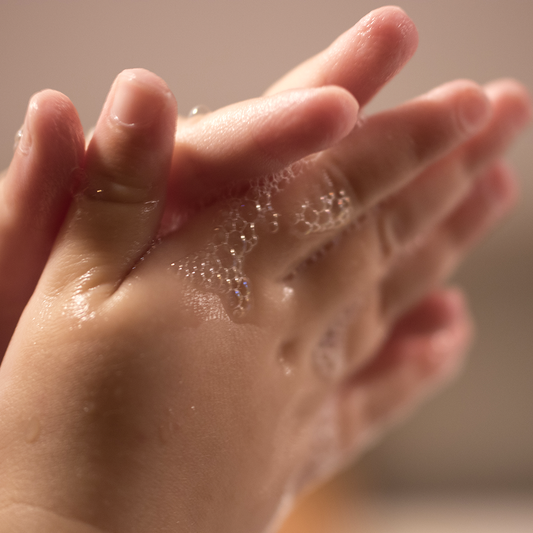
You probably never thought of natural soap as a lethal weapon -- but it can be for some viruses. The CDC says that for good hand hygiene all you need is plain natural soap and water.
Read Post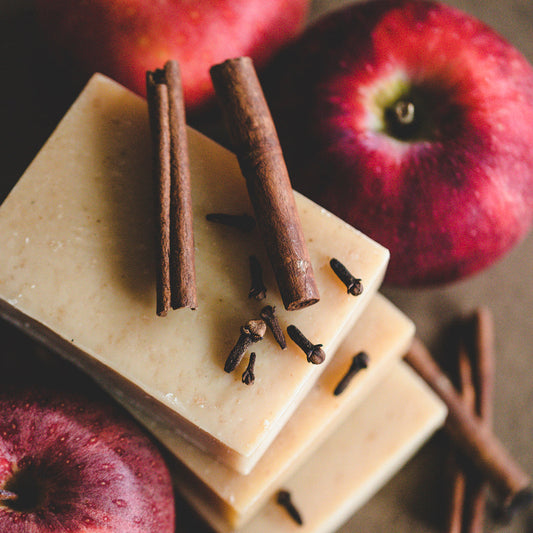
From its composition to its benefits for the skin, to its impact on the environment, the level of care that goes into producing a batch of natural soap is unparalleled in commercial soaps.
Read Post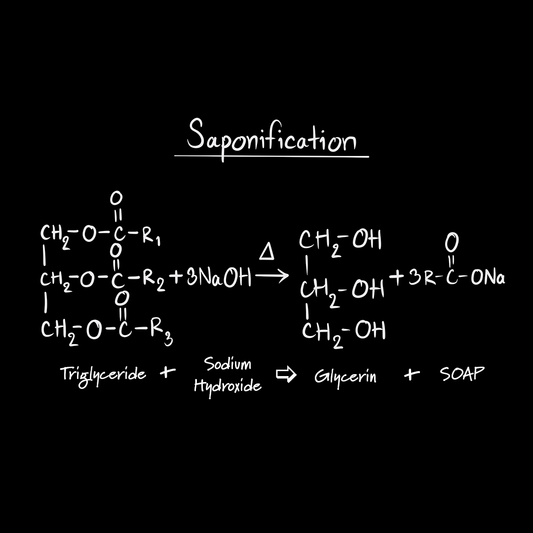
Discover the science behind handmade soap making. Learn how understanding saponification, fatty acid profiles, and ingredient selection can help create high-quality, nourishing soap bars.
Read Post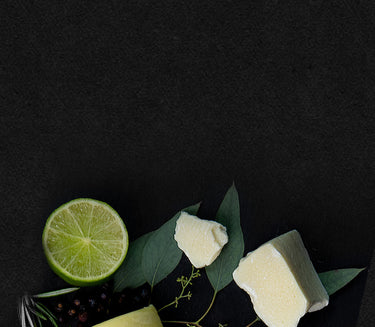

People with severe allergies—please note: If you have severe anaphylactic-type reactions to ANY of the ingredients in ANY of our products, please do not buy our products. We have dedicated soap rooms and product rooms that are kept meticulously clean, but we cannot guarantee against possible cross-contamination of individual ingredients.
Chagrin Valley Soap & Craft is not responsible for any individual reaction to any particular ingredient. Each product description on our website includes a complete list of ingredients. People with sensitivities to any listed ingredient should not use the product. In case you are in doubt always try an allergy patch test and if at any time irritation occurs, discontinue use of the product.
The content and information on this website, provided by The Chagrin Valley Soap & Salve Company, is for educational purposes only and is in no way intended and should not be construed as medical advice to diagnose, treat, cure, or prevent any disease or health condition. The information regarding folklore or health-related benefits of certain ingredients is for educational purposes only. The information provided is not intended to prescribe or be taken as medical advice.
The information provided is not meant to substitute the advice provided by your personal physician or other medical professionals. Do not use the information found on this website to self-diagnose any medical conditions or treat any health problems or diseases. If you have medical concerns regarding yourself or your family you should seek the advice of qualified, licensed health professionals. Never disregard professional medical advice or delay in seeking it because of something you have read on this website.
This information has not been evaluated by the Food and Drug Administration. This notice is required by the Federal Food, Drug and Cosmetic Act.
Read our Full Medical Disclaimer.